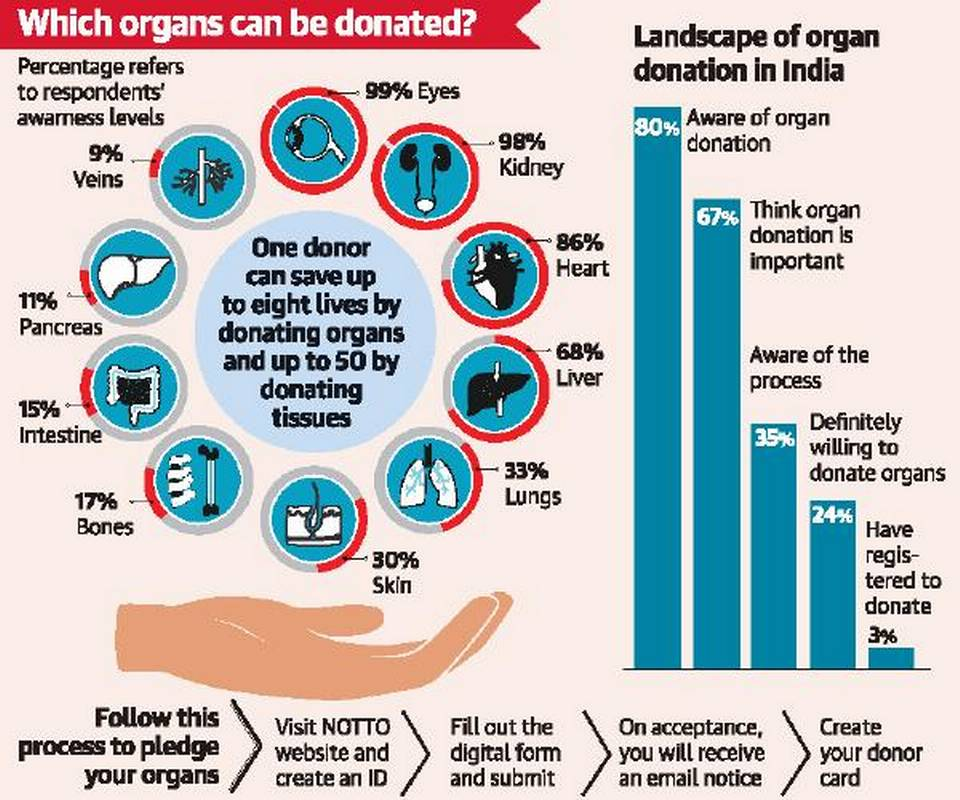Social Justice
Organ Donation
- 02 Dec 2019
- 6 min read
This article is based on “Getting organ donation to tick again” which was published in The Hindu on 30/11/2019. It talks about the various issues related to organ donation in India.
Recently, the Government of India celebrated the 10th Indian Organ Donation Day on 30th November. It was organised by the National Organ & Tissue Transplant Organization (NOTTO).
- It was observed with the primary objective of promoting organ donation and transplantation so that the number of people suffering from organ failure can get a new lease of life.
- As per Global Observatory on Donation and Transplantation, India performs the second largest number of transplants in the world, after the USA.
Issues Related to Organ Donation
India has a dismal 0.65 per million population (PMP) organ donation rate and around 5 lakh people die every year in India due to unavailability of organs.
- Infrastructure: There is a huge scarcity of Organ Transplant and Retrieval Centres in the country.
- There are just 301 hospitals equipped to handle the transplant process and only 250 of them have been registered with National Organ and Tissue Transplant Organisation (NOTTO).
- Currently, for organ transplant, there exists only 1 fully equipped hospital for around 43 lakh people.
- Trust Deficit: Altruistic donation has been the major source of organ transplant in the country. However, a false negative perception has been growing against private hospitals of their nexus related to organ transplant.
- A classic example of this negative publicity is seen in the steep drop in organ donation in Kerala — from 76 deceased donors in 2015 to 8 in 2018.
- Inequality and Accessibility: A majority of donors are from the lower middle class and below, while the majority of organ recipients are from the small number of persons who can afford transplant surgery and costly lifetime medication thereafter.
- An organ comes free, as donated to the society, but the transplantation cost associated with it is around 5 to 25 lakh. This cost reduces the accessibility to organ transplant to the weaker section of the society.
- The cost factor is the key reason why more than three quarters of donated hearts and lungs do not get taken.
- Superstitions and Misconceptions: It is a common misconception that organ donation disfigures the deceased donor’s body, which prevents people from enrolling into the donation.
Altruistic Donation
- Altruism is acting out of concern for another’s well-being. People behave altruistically when they see others in desperate circumstances and feel empathy and a desire to help.
- Altruism is the ethical basis for the donation of bodily material and continues to play a central role in ethical thinking in organ donation.
Way Forward
- Affordability: For increasing accessibility of donated organs to weaker sections, the public hospitals need to increase the infrastructural capacity to carry out transplantation and provide affordable proper treatment to the poor.
- Cross-subsidisation: It is suggested that cross-subsidization will increase accessibility to the weaker section. For every 3 or 4 transplants, the private hospitals should carry out free of cost transplantation to the section of the population that donates a majority of organs.
- Targeting Low Priority Services: India spends around 1.2% of GDP on health which is quite low, therefore focussing more on organ-failure prevention would generate better health outcomes.
- Regulation: The Transplantation of Human Organs Act, 1994, need to be amended to substitute the rigid bureaucratic procedure of hospitals by self-declaration and mandatory verification involving civil society.
- Secondly, the Act also needs to address the issue of interference of the central government in organ distribution and should ensure full autonomy to States in matters related to organ transplant.
- Transparency in organ transplant can be increased by making the organ distribution procedure online and making online availability of full details.
Transplantation of Human Organs Act, 1994
Transplantation of Human Organs Act was passed in 1994. It provides various regulations for the removal of human organs and its storage.
It also regulates the transplantation of human organs for therapeutic purposes and for the prevention of commercial dealings in human organs.
Main Provisions
- The act recognises brain death identified as a form of the death process and defines criteria for brain death.
- It provides regulatory and advisory bodies for monitoring transplantation activity.
- It also provides for maintenance of a registry of donors and recipients of human organs and tissues.
- Awareness: Removing the misconceptions and myths about organ donation can play a significant role in addressing organ deficiency in the country.
- According to the BBC report, there would be no requirement of the living donor if 5% of deceased patients from road accident opt for organ donations in India.
| Drishti Mains Question Briefly mention various issues related to organ transplantation in India. |







